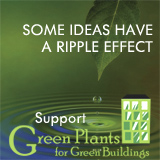

Interiorscape Forum / Scaper Talk Discussion Forum / Sales and Marketing / Pat your Houseplant on its back.
Pages: 1
| Posted: 17 Jan 2012 23:55 | |
|
Registered User Currently Offline Join Date: Jan 2012 |
Posts: 28 Reputation: 3 User Rank: 1 - Seedling 
|
|
I wrote this some time ago and was looking for a suitable place to share it.
This looks like that place. Pat your Houseplant on its Back. It's doing more than you think. Plants look good indoors, especially when they are well placed and well cared for. They also remove carbon dioxide from the air and replace it with oxygen; and they do so with the energy they obtain from light only. The other by-product is water vapor which helps to cool the environment. (That is why it feels cooler when we climb into a tree). It bears emphasizing that not a single harmful by-product; nor depletion of any scarce energy resource results from the natural and elegant process of photosynthesis. But wait! There is more! Houseplants remove volatile organic compounds (VOCS) which are undesirable vapors in the air we breathe. To be sure, they are present in very, very small quantities, but they are all around us. The level of VOCS is greater in our houses than it is in the air outside for two reasons: 1. VOCS are given off by many of the materials used in building construction; like the dry wall and carpeting, the adhesives that hold them together and the paints that add color and finish. 2. We seal our houses to reduce the cost of energy needed for heating and cooling. At the office there is more of the same - computers, printers and copy machines; the toners and the carbonless paper that they use; and the markers and glues we use in presentation materials. It is no use getting into your car to get away from it all; VOCS are present there also. That new car smell, say the experts, is a combination of VOCS given off by the plastics, fabrics, paints and finishes used in putting together your car. VOCS are removed when the air is changed. The more frequently this is done, the better - 10 ACH (Air Changes per Hour) is probably a good rate for the home. (http://www.engineeringtoolbox.com/air-change-rate-room-d_867.html). However, we are constantly lowering the ACH figure as we try to conserve on heating and cooling costs. Every benefit has its trade-off! For a long time ventilating and air conditioning were the only ways to facilitate air exchange. We can now add indoor plants. Many experiments have been carried out to provide evidence that plants improve indoor air quality. The most well-known is probably the work done by NASA in its effort to produce a wholesome atmosphere in space vehicles and stations. "How to grow Fresh Air" by B. C. Wolverton, the scientist who conducted the experiments, is a very readable book on this interesting subject. The author rates 50 indoor plants on their efficiency at removing pollutants and gives good advice on how to grow each one. I was quite pleasantly surprised to find many common plants in there. It appears that we have been doing the right thing intuitively! I wish to emphasize that the quantities are very small. Do not expect a plant or two to free your living room of VOCS . Also, other studies have shown that indoor plants can themselves add VOCS to the air. The plant, container, potting soil, organisms and fertilizer/pesticides all add their share. So, choose them carefully, nurture them knowledgeably and enjoy the full beauty and benefits of your indoor plants. |
|
| Posted: 19 Jan 2012 04:07 | |
|
Registered User Currently Offline Join Date: Jan 2011 |
Posts: 798 Reputation: 43 User Rank: 10 - Blossom 
|
|
Before you get too moist about the clean-air thing, read this article and do the math:
http://www.practicalasthma.net/pages/topics/a ... There were some serious deficiencies in Wolverton's experiments and some gross exaggerations in his recommendations, apparently. If these corrected calculations are wrong, please feel free to enlighten... Clem |
|
| Posted: 19 Jan 2012 13:38 | |
|
Registered User Currently Offline Join Date: Jan 2012 |
Posts: 28 Reputation: 3 User Rank: 1 - Seedling 
|
|
I did not write from a scientist's point of view; nor was my targeted audience the Plant Technician. I have used some of the ideas as a marketing tool. Indeed, I loaned the book to to a few clients who were reassured that plants on their premises are a justifiable expense.
In these times of uncertain profitability, clients proclaim that "plants contribute nothing to the bottom line". And I have been hard put to present a convincing and conclusive argument in rebuttal. As far as I have ascertained, no one else has. The piece is a pitch to the client and that is why I thought that this would be a good place to post it. |
|
| Posted: 19 Jan 2012 16:30 | |
|
Registered User Currently Offline Join Date: Jan 2011 |
Posts: 798 Reputation: 43 User Rank: 10 - Blossom 
|
|
All well and good, but what are you if the underlying science behind your marketing claims is unsound or exaggerated? Then you are guilty of greenwashing, and your marketing pitch becomes a lie, and your integrity becomes a casualty.
Clem |
|
| Posted: 20 Jan 2012 12:05 | |
|
Registered User Currently Offline Join Date: Jan 2012 |
Posts: 28 Reputation: 3 User Rank: 1 - Seedling 
|
|
There are many instances of unexplored (unknown?) sound science being dismissed as 'unsound or exaggerated'. Names like Columbus, Copernicus and Avogadro spring to mind immediately.
It has been said that SF(iction), no matter how far-fetched, has predicted SF(act). Jules Verne wrote "20,000 Leagues" in 1869! My experience has taught me that everyting out there is to be confirmed or refuted. As long as we keep an open mind, that gets done. |
|
| Posted: 20 Jan 2012 16:27 | |
|
Registered User Currently Offline Join Date: Jan 2011 |
Posts: 798 Reputation: 43 User Rank: 10 - Blossom 
|
|
Those were different times. The accumulated scientific knowledge of those times could fit into a spiral notebook compared to what we know today.
Read the article completely and then let's discuss it intelligently. Science doesn't play favorites and it doesn't care who's right, only that we get to the truth. Clem |
|
| Posted: 21 Jan 2012 11:24 | |
|
Registered User Currently Offline Join Date: Jan 2012 |
Posts: 28 Reputation: 3 User Rank: 1 - Seedling 
|
|
Thanks, I will read the article completely.
As for discussing it intelligently, I am unsure that you are the person that I'd want to do so with. My reason is that you and I are on different wavelengths where the science of things is concerned. My experience has been that such discussions generate more heat than light. You use words 'science' and 'truth' in a single single sentence that detracts from the meaning of each. And this is my final post on this subject. |
|
| Posted: 21 Jan 2012 16:35 | |
|
Registered User Currently Offline Join Date: Jan 2011 |
Posts: 798 Reputation: 43 User Rank: 10 - Blossom 
|
|
And so he took his ball and went home. That certainly advances the cause of science and truth immensely.
But I'm sure there are actually people in our industry who are willing to take the time to vet the claims and do their due diligence before buying into the cult. And this can be a great place to discuss issues like this one that impact our industry and our individual businesses. And there are no "different wavelengths where the science of things is concerned"...science is science; everything else is subjective. Clem |
|
Pages: 1
Interiorscape.com is sponsored by NewPro Containers ![]() RSS 2.0
RSS 2.0 ![]() Atom 1.0
Atom 1.0













